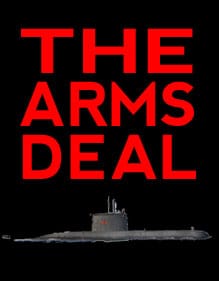|
Getting your Trinity Audio player ready...
|
 The first phase of the two-man Arms Procurement Commission, or the Seriti Commission, started on 20 January and was meant to wrap up in May with the testimony of former president Thabo Mbeki, but his appearance was postponed because of his mother’s death. Phase two of the commission started on 21 July.
The first phase of the two-man Arms Procurement Commission, or the Seriti Commission, started on 20 January and was meant to wrap up in May with the testimony of former president Thabo Mbeki, but his appearance was postponed because of his mother’s death. Phase two of the commission started on 21 July.
The commission is investigating “allegations of fraud, corruption, impropriety or irregularity in the strategic defence procurement package” and will question the rationale for the arms deal, whether the equipment purchased is adequately used or not, and whether job opportunities linked to the arm deal have materialised or not – among other tasks. Allegations have been levelled against suppliers as well as those on the procurement side.
The commission was set up in 2011 by President Jacob Zuma, who appointed Judge Willie Seriti, a justice of the Supreme Court, to head the probe. Seriti was to be flanked by judges Willem van der Merwe and Francis Legodi, both of whom resigned before hearings began. He is now assisted by Judge Hendrick Musi, judge president of the Free State High Court, who was appointed after Van Der Merwe left. Legodi has not been replaced.
The commission has overcome a few stumbling blocks – a senior investigator and a law researcher also quit before proceedings had even got under way, and the commission’s secretary, a top attorney, was found dead, apparently by his own hand, in his car in KwaZulu-Natal in 2012.
The first sitting took place on 19 August 2013 and adjourned on 25 November. The first stage was scheduled to finish at the end of the year, but burst water pipes, power cuts, Seriti falling ill, and requests by witnesses for extra preparation time have caused delays in the proceedings.
Commission spokesperson William Baloyi said in a statement: “This phase will therefore be carried over to the new year and in turn this has necessitated that the schedule of witnesses and timetable be revised.”
High-profile witnesses
Witnesses in the first session came mostly from the navy and air forces, and there were also some Armscor officials. Rear Admiral Alan Green was the first witness, with Robert Vermeulen of Armscor, Brigadier-General John Bayne, Brigadier-General Piet Burger, and Rear Admiral Robert Higgs, among others, also testifying during the first round.
Several top-ranking officials and former officials are lined up to testify in the forthcoming session. They include former president Thabo Mbeki, as well as former finance minister and now national planning minister Trevor Manuel and former trade and industry minister Alec Erwin. Also on the list of witnesses is Absa group CEO Maria Ramos, Manuel’s wife, who was director-general of the Treasury at the time the arms procurement deal was authorised.
Testimony by officials from the Department of Trade and Industry will take up the first five weeks. Besides Erwin, current director-general Lionel October will testify.
The next four weeks are allocated to officials from Armscor, and in late March representatives of the Department of Defence, including former minister Mosiuoa Lekota, former deputy minister Ronnie Kasrils and former secretary of defence Pierre Steyn, will appear.
In mid-April former Treasury officials will testify. They include Ramos, Manuel, Reserve Bank deputy head Lesetja Kganyago, who was Treasury head of international financing at the time, and current deputy director-general Andrew Donaldson.
From 5 to 9 May it will be the turn of the government’s chief negotiator in the arms deal, Jayendra Naidoo, and Mbeki will appear between 12 and 16 May.
The upcoming session will be of great interest to corruption fighters, as it will feature witnesses who will “testify about the allegations of impropriety, fraud and corruption and will include the so-called whistleblowers and people implicated in wrongdoing,” according to Baloyi.
He added that the list is “not exhaustive” and that other witnesses have yet to be called.



